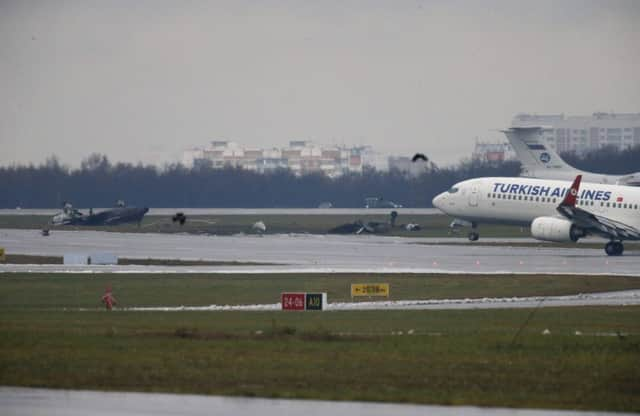Driver of snow plough which killed oil mogul ‘drunk’


Christophe de Margerie died along with three crew members when his corporate jet collided with a snow plough on Monday night.
Federal investigators said the driver of the snow plough was drunk and that “negligent” managers at the airport had failed to co-ordinate the actions of their employees.
Advertisement
Hide AdAdvertisement
Hide AdThe Investigations Committee of Russia, a federal agency which answers to president Vladimir Putin, is investigating the crash.
Spokesman Vladimir Markin said: “It is already obvious the cause of the events was not at all a horrific tragic confluence of circumstances, which is how representatives of the airport are trying to present it, but criminal negligence by officials who could not ensure the co-ordinated actions of airport employees.”
He said a number of officials were likely to be suspended but gave no further details.
Mr de Margerie was killed when a business jet collided with the snow plough during take-off at Moscow’s Vnukovo International Airport, the company and airport officials said.
The collision occurred late on Monday, just minutes before midnight Moscow time, the airport said in a statement. The Dassault Falcon business jet carrying Mr de Margerie had been due to travel to Paris.
“Total confirms with deep regret and great sadness that chairman and CEO Christophe de Margerie died on 20 October in a private plane crash at Vnukovo airport in Moscow, following a collision with a snow removal machine,” the company said, also confirming that the plane’s three crew had died.
Total is France’s second-biggest listed company with a market value of €102 billion (£805bn). Visibility was 1,150ft at the time, the airport said, adding that civil aviation authorities had launched an investigation.
Vnukovo is Moscow’s oldest and third-biggest airport.
Located south-west of the capital, it is used by Mr Putin and other government officials.
Advertisement
Hide AdAdvertisement
Hide AdMr de Margerie, 63, was on a list of those attending a Russian government meeting on foreign investment in Gorki, near Moscow, on Monday.
With his distinctive bushy moustache and outspoken manner, he was one of the most recognisable figures among the world’s top oil executives.
“France is losing an extraordinary business leader who turned Total into a world giant,” French prime minister Manuel Valls said. “France is losing a great industry captain and a patriot.”
A graduate of the Ecole Supérieure de Commerce in Paris, Mr de Margerie became chief executive officer of Total in February 2007, taking on the additional role of chairman in May 2010, after previously running its exploration and production division.
Mr de Margerie said in July that he should be judged based on new projects launched under his watch, such as a string of African fields. He also said then that Total would seek his successor from within the company rather than an outsider.
Philippe Boisseau, head of Total’s new energy division, and Patrick Pouyanne, who was tasked with reducing the group’s exposure to unprofitable European refining sectors, have long been seen as potential successors.
A staunch defender of Russia and its energy policies amid the conflict in Ukraine, Mr de Margerie said in a July interview that Europe should stop thinking about cutting its dependence on Russian gas and focus instead on making those deliveries safer.
He said tension between the West and Russia were pushing Moscow closer to China, as illustrated by a $400bn (£240bn) deal to supply Beijing with gas that was clinched in May.
Advertisement
Hide AdAdvertisement
Hide Ad“Are we going to build a new Berlin Wall?” he said in the interview.
“Russia is a partner and we shouldn’t waste time protecting ourselves from a neighbour. What we are looking to do is not to be too dependent on any country, no matter which.
“Not from Russia, which has saved us on numerous occasions.”
Total is one of the majors most exposed to Russia, where its output will double to represent more than a tenth of its global portfolio by 2020.